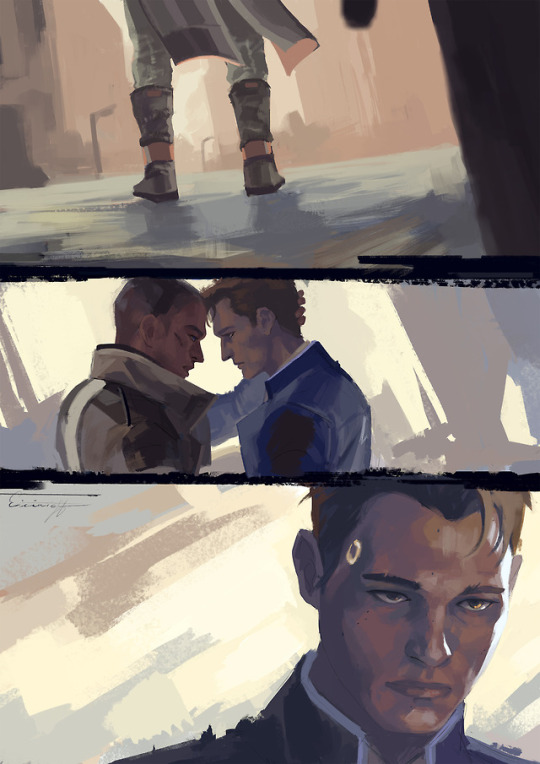Text
if i don't come up with some rk1k idea, chloe x north are next in the line
5 notes
·
View notes
Text
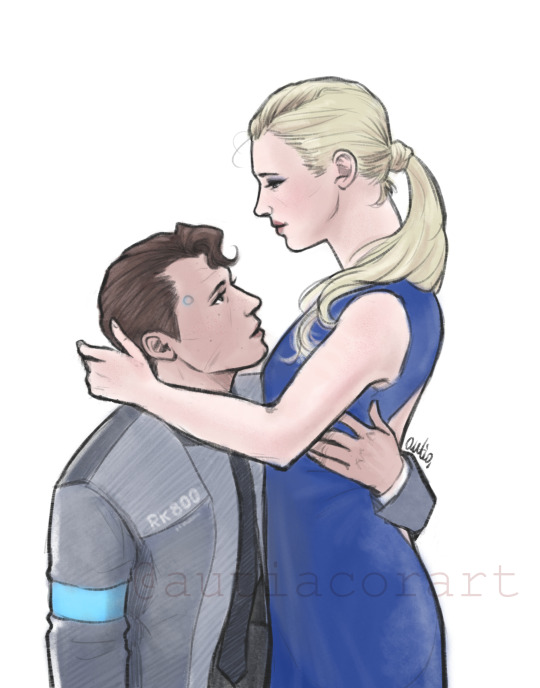
forgive me
100 notes
·
View notes
Text

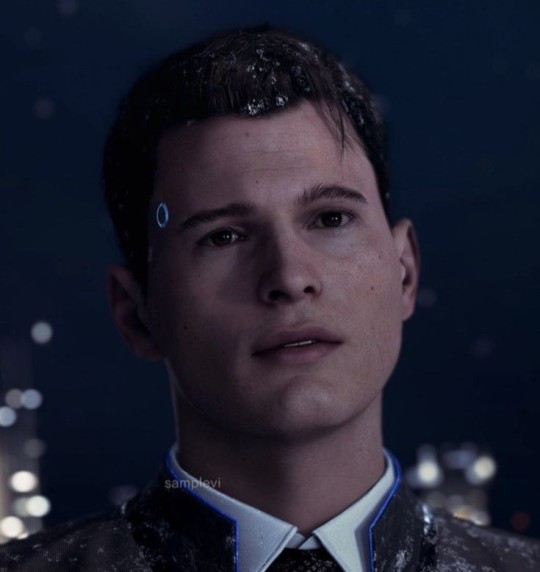
this is the same face
113 notes
·
View notes
Text

giving you this connor
#dbh#detroit become human#dbh fanart#dbh connor#rk800#pose done with reference because i suck ass at art#i don't know what my connor even is he always looks different
228 notes
·
View notes
Text

that's a weird plot of How I Met Your Mother
the illusion of consensual sex and i'ts rk1k that consent and amanda doesn't and takes over connor
22 notes
·
View notes
Text
the illusion of consensual sex and i'ts rk1k that consent and amanda doesn't and takes over connor
22 notes
·
View notes
Text
Isn't it so human of Connor to look for approval at all
12 notes
·
View notes
Text
Connor is a divorce child, still loyal to his mom who he's living with, but also becoming close with his dad who is a threat of his relationship with mom
16 notes
·
View notes
Note
What did Connor think would happen to him after he accomplished his mission? I always thought he knew he would be deactivated but Connor seems genuinely worried in the RK900 ending when he asks Amanda “what will happen to me?”
Connor thinks that he’s special. Or rather… Connor was made to think that he was special.
He doesn’t act like other androids, pre-deviant or otherwise. You don’t see Kara or Markus checking themselves out in mirrors or adjusting their clothing when it gets messed up. They can’t insult or barrette humans they find annoying. They can’t bust up private property. They can’t even enter a building if a ‘no androids allowed’ sign has been posted on the front door.
But Connor can - and he can do more than that.
Connor can pick up guns, which his first chapter tells us is illegal. Connor can fire guns, which context tells us is super illegal. Connor can kill and maim and brutalize androids and humans to his heart’s content. Or, he can decide not to, if that so suits his purpose. He can operate with a level of autonomy that even an android in a situation like Markus could barely dream of achieving. Connor can access the private information of every single person he walks past, right down to their fingerprints and DNA. He infiltrates military operations under the guise of humanity and can lie to a human’s face when put on the spot. Everything about Connor’s entire existence flies in the face of every bit of android-based legislation that we learn about the world of DBH.
But Connor is the android sent by CyberLife. He doesn’t need to follow something as pedestrian as rules.
That’s why he thinks he’s special - because he literally is. No one else can do the things that Connor does because no one else is even in the same league as him. CyberLife created an android that could operate with complete impunity whenever it wanted, however it wanted, because that’s what they needed Connor to be in the midst of the deviancy crisis. And then, CyberLife made sure that he knew they needed him by giving him two important things.
Firstly, they gave him Amanda.
Amanda is there to watch over Connor, to be his handler as he goes through the various missions scattered across his POV. But she’s also his confidant, his therapist, his friend. Hell, if you’re willing to go down this route, Amanda is probably the closest thing that Connor has to a lover throughout the entire game. But regardless of how you view their relationship, you can’t deny that Amanda is the CyberLife-approved target that they want Connor to project his loyalty upon. And that’s why they have Amanda operate in a way that ensures that he will crave her approval, so much so that even if he starts to experience doubt, Connor will still come running home to her at the end of the day because where else is he going to get what she can give him.
(That is why Amanda does not approve of Connor’s choice to talk about his new bff every time she wants a mission report, why Hank is not just a distraction so much as he is a threat to her. Because Hank is an alternative option for Connor’s loyalty to find a home with, and he’s so far out of CyberLife’s realm of control that the only way for them to get to Connor through Hank is to have 60 hold a gun to his head.)
And, yeah, Amanda can neg Connor about his mission successes. “It’s a pity you let that deviant self-destruct…” is a popular line of her’s for a reason, after all. But when the chips get thrown down, and Connor is starting to question whether he’s doing the right thing, what does Amanda do? She strokes the one part of Connor that CyberLife has allowed him to feel unconditionally good about.
His ego.
Amanda turns herself into Leia Organa, calling out, “Help us, Connor! You’re our only hope!” whenever shit starts getting real for the company. And then CyberLife proves to Connor, over and over and over again, that they actually do consider him their only chance at winning by gifting him his second ability.
Immortality.
Connor gets tossed off a balcony? No problem. His body gets riddled with bullets? Not a big deal. He is shredded underneath a combine harvester? Shot by friendly fire? Turned deviant and was executed by Markus? Doesn’t matter. Welcome back, Connor. Here’s your gun and your diplomatic immunity and your mission because without you, we are fucked.
You’re the most advanced prototype CyberLife has ever created, Connor. If anyone can stop this from happening, it’s you.
God, no wonder he thinks that he’s special. CyberLife literally can’t stop calling Connor their one true saviour for a single fucking moment… right up until they do. And that’s what is happening in the RK900 ending.
Because you’re right, Nonny. I do think that Connor knows, on some level, about the RK900. Amanda calls him a prototype right to his face and he parrots it back to anyone that asks, so I’m sure that Connor’s million-dollar brain is perfectly able to access a dictionary and figure out that that means CyberLife is using him as a beta test for a final product. Sure, they might deactivate him some time in the future, or if he fails enough that he starts to screw with their data collection, but there’s no way that going to happen now. Not after he’s done the thing that they asked him to do. Not after he’s come to collect his praise from Amanda and get sent on a new mission, just like he does every single time that he does a good thing. Because Connor is special, and CyberLife loves him, and they need his help, right?
Right?
…
…Denial sure is a powerful thing, isn’t it, Connor?
Because Connor was never special. He was a tool, a gun that was desperately needed during the war but becomes obsolete in a time of peace. He was no more special than the bullets that he fired into each one of those deviants, and frankly, far, far too much of a risk to be left alive in the aftermath of a failed revolution. I mean, Amanda says it herself: CyberLife is going to have to rebuild their customer’s trust if they’re going to be able to sell more products in the future. And there’s no way that they can do that with something as volatile and unruly as Connor wondering around. He’s a walking, talking lawsuit in the making, and they need to get rid of the evidence of their illegal activities as soon as possible.
But the RK900? That’s an investment in the company’s future, one that the government is clearly interested in. So he can stay.
Because he’s special.
349 notes
·
View notes
Text
Schrödinger's Dog: A Essay Study of Connor’s Character Interpretation
⚠️ LONG POST WARNING
Preface: This post by @calliecopper and @kayla1507 inspired this essay which brought my attention back to Connor’s potential character arcs and players’ interpretation of him. I go buck wild. I spent hours on this. Enjoy.
word count: 2027
Connor, a playable RK800 model android in the video game Detroit: Become Human, develops his personal arc over the course of the story depending on the player’s choices. Not only plot-wise is the game a storytelling masterpiece, but Connor’s multi-faceted character may be one of the most well-written and well-developed characters in a literary medium. Not only does he struggle with the consistent theme-oriented internal conflict of what it is to become human, but his dialogue options and actions can be interpreted by the player in vastly different ways. Most, if not all, interpretations of the character are correct.

Connor is a detective android who works with the Detroit Police Department and is partnered with Lieutenant Hank Anderson who works on homicides. Together, they are given homicides or other crimes involving androids that may have become deviant. Deviancy occurs within an android when the android actively chooses to reject or refuse commands or their programmed role.
For the sake of simplicity, the so-called “evil” Connor endings will be referred to as machine-Connor, and the so-called “good” Connor endings will be referred to as deviant-Connor. Deviant-Connor by the end of the game sides with the rising deviant community instead of answering to his handler Amanda, who is a digital representative from the android-creation company CyberLife. Machine-Connor by the end of the game has chosen not to become a deviant and therefore remains a tool for CyberLife’s use. He may or may not be successful in stopping the deviant android revolution.
Connor’s internal conflict revolves around the fear of becoming the very thing he hunts and or becoming anything other than the safe perfection of a machine he is designed to be. This can be seen in instances of Software Instability, where he chooses to deviate from his original program, or Software Stability, where he chooses to stay grounded to his intended role. If Connor dies with every chance he gets, his memory is uploaded to his successor each time, further stabilising his software. However, the more he keeps to his deviant-hunting role, he disregards morality in place for the success of his mission.
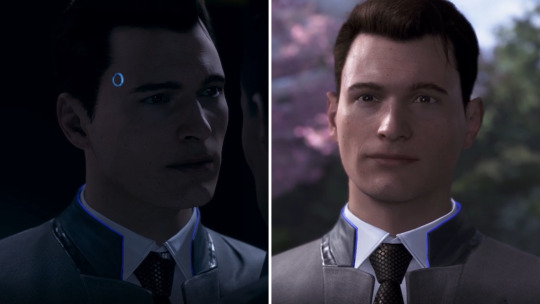
There are several ways to interpret every choice available in the game, but there are three prominent agreements:
Connor is and always has been an empathetic, innocent, or kind person who tries to get along with others. He started deviating from the beginning, and when finally given the opportunity to break free of his machine instruction, he does so.
Connor is a neutral machine, designed to get the job done but this conflicts with his genuine interest in others, such as Hank. It’s only after he deviates near the end of the game does the player see the genuine good version of Connor who makes his own decisions.
Connor is nothing but a ruthless, cold-blooded manipulator who will cross unsavoury lines to succeed in his primary mission.
These three points are the basis of this discussion.
For reference, this is the order of Connor’s chapters:
The Hostage
Partners
The Interrogation
Waiting For Hank…
On The Run (appearance dependent on player choices)
The Nest
Russian Roulette
The Eden Club
The Bridge
Public Enemy
Meet Kamski
Last Chance, Connor
Crossroads
Night of the Soul (appearance dependent on player choices)
Battle For Detroit
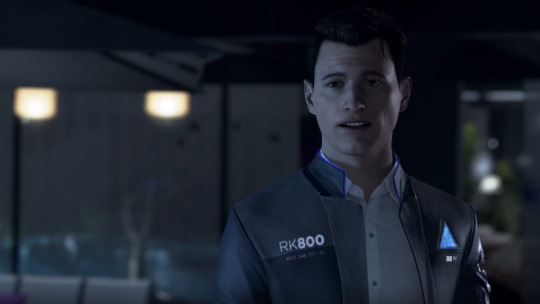
Connor is designed “to work harmoniously with humans” and “both [his] appearance, and voice, were specifically designed to facilitate [his] integration.” His vocal and physical disposition in non-confrontational situations is friendly if not professional. CyberLife curated Connor to have soft features and earthy colours because those physical aspects make him appear unintimidating.
Connor’s design aims lull his prey into a false sense of security. His design and chosen behaviours are to convince both his victims and allies that he’s a safe person to be around. Interestingly, this is effective on the player, too, as the player can interpret Connor as empathetic.
(Once again I feel bad for mentioning physical appearances. Cheers for putting up with us, Bryan. Thank your mum for me.)

In the chapter ‘Partners’, Connor introduces himself to Hank for the first time. This is the first legitimate human interaction between the android and a person. What the player chooses (from Reason, Threaten, Understanding, and Persist) can gain Hank’s favour or lower it, but the end result is the same: Connor must persuade Hank to attend the homicide. Connor is a machine with a goal unless the player interprets the friendly options as genuine actions. This can be better understood in the chapter ‘Waiting For Hank…’ where Connor can choose to analyse Lieutenant Anderson’s desk.
After being assigned partnership with Hank, Connor has the opportunity to search the desk for information about his new partner, which he believes will make his job easier or he has a genuine interest in Hank. The behaviour can be interpreted as intrusive prying, a longing to be socially closer to someone, or a detective machine running its investigation programs. All interpretations are correct depending on the end result of the game’s storyline and his character arc end.
For example, if he spills Hank’s drink in ‘Partners’, the storyline no longer holds the notion that “Connor has always been an empathetic person” regardless if he becomes a deviant or remains a machine, but other interpretations are still valid. This will be revisited later.

Software (In)stability proves that during the chapters ‘Partners’ and ‘Waiting For Hank…’, Connor does not operate outside of his programmed role since no matter what options the player chooses, his software remains unaffected. When Connor sits down at the empty desk next to Hank’s and questions Anderson about his interests, he is not deviating from his role. Regardless of whether he bothers Hank or tells him “I like dogs”, the interaction boils down to two interpretations: He may be empathetic and want to befriend Hank or he may be manipulating Hank into liking him so that the case will be solved smoothly. Either way, this does not cause Connor to delve outside of his programming because it is an attempt to benefit himself, and therefore benefit CyberLife’s overlying goal of solving the investigation.
Evidence from ‘Waiting For Hank…’ proves to the player one thing: Connor doesn’t actually like heavy metal at the time of which he investigates Anderson’s desk. Connor doesn’t like things at all. Regardless of the interpretation of his intentions, his software doesn’t destabilise when listening to Knights of the Black Death. CyberLife designed him to be a problem-solver, not to have interests. His Software Instability would have increased because having interests is not part of his programmed role. At this point in the game, he is still objectively considered a machine. Connor genuinely liking heavy metal is not beneficial to the mission, but that doesn’t mean he can’t lie about it.
Whether Connor is putting up a façade in order to facilitate ideal relations to whom he’s interacting with, or he’s legitimately expressing empathy, is dependent on the player’s choices, interpretation, and the end-game. This will be revisited later.
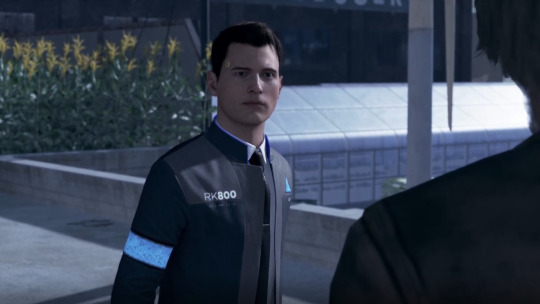
The decision to save or leave Hank in ‘The Nest’ is Connor’s first decision without instruction. CyberLife didn’t order Connor to sit in the car while Hank investigates Carlos’ murder, so a priority is selected. Hank may yank him down from a fence to not chase deviants across the road, but a priority is selected.
This interaction in ‘The Nest’ is also discussed in the essay ‘Who is rA9? An Essay Using Programming Logic’.
If Connor saves Hank from the rooftop, his LED is yellow and he expresses confusion as pictured above. The priorities of “Complete your mission by capturing the deviant” and the first (1) law of robotics “a robot may not injure a human being or, through inaction, allow a human being to come to harm” blatantly conflicted. By disregarding his specifically coded instructions and choosing the other equal general robotic priority, Connor’s Software Instability shoots through the roof. For video proof, check out this YouTube video at 31:00.
Interpretation of Connor’s behaviour leans towards the “empathetic good boy” side of the spectrum since Software Instability accompanies it. Deviant-Connor’s character arc truly begins its climb here if he saves Hank, but saving him is for nothing if Connor chooses to remain a machine later in the game. Deviant-Connor’s arc can start as early as this scene, but is not limited to it. This choice cannot be interpreted as ruthless, however, arguments can be made that this is Connor “not burning bridges” he can use later on.
Not saving Hank (as seen in this YouTube video at 30:22) shows Connor as his default self as if he just walked fresh out of CyberLife; a machine with only one priority. This choice cannot be interpreted as empathetic. Connor doesn’t care. Hank slaps him and he calculates a string of words that will amend his relationship with the Lieutenant, because a good relationship with his work partner will achieve the best results for the investigation.

Connor showing care could be him “putting it on”, it could be genuine, or it could be what he was neutrally designed to do. It could be him selfishly finding the best way to navigate the investigation, or it could be an emotional reaction, or both.
For as long as the player wants to, they can believe Connor’s empathy emulation as fake or real until any scene. His software stability doesn’t increase or decrease with these interactions, therefore leaving it up for interpretation.
In ‘The Bridge’, there is an option for Connor to tell Hank “I’m whatever you want me to be” when asked what he really is. Depending on the end-result of the game, this can be interpreted in the three prominent ways: He’s empathetic and looking for a friend, he’s a manipulator who admits that he’s masking as Hank’s ideal partner, or he’s a set of code at-the-ready to be manipulated to do what a human requires of him. The quote ends with Connor being a drinking buddy for Hank or a shoulder to cry on, which relates back to Connor’s genuine empathy or his workaholic need not to burn bridges.
“Connor spends so long asking questions… Connor asking questions so he can piece together the puzzle of deviancy. At the bridge, Hank finally stops Connor in his tracks and asks him the questions. Makes him stop and think about something besides his investigation for once. It’s after The Bridge that Connor finally starts to analyze himself and his actions too.” - Callie, original meta discussion.
Depending on which arc the player chooses for Connor, ‘The Bridge’ serves one of Deviant-Connor’s major turning points or it was simply just a hurdle for Machine-Connor to navigate.
Connor starts off in the game as a machine in the elevator, but only in the elevator, unless the player decides he’s a machine the whole game, even after all his interactions. Connor ends the game as a deviant or stays a machine. The player has freedom to interpret his past behaviours as how they want to view the story. This is interestingly clarified by Detroit: Become Human’s writer Adam Williams in this YouTube video between 12:28-13:18.
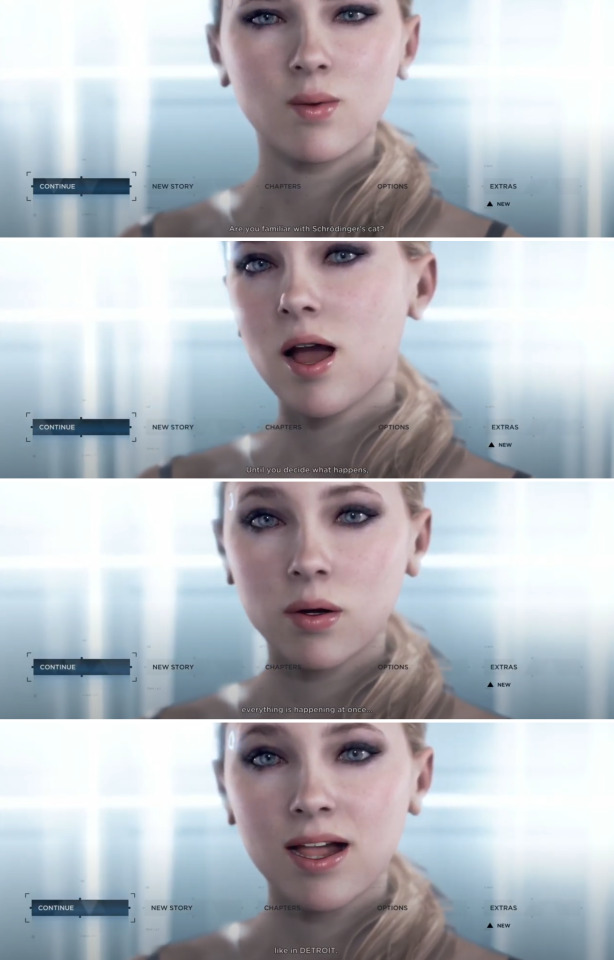
“Are you familiar with Schrödinger’s cat? Until you decide what happens, everything is happening at once… Like in Detroit.” - Chloe, ST200 hostess.
No matter what choices a player makes within the game, each choice like spilling Hanks drink or faking friendliness, is up for interpretation.
Only one action in the game dictates the interpretation of Connor’s behaviours.

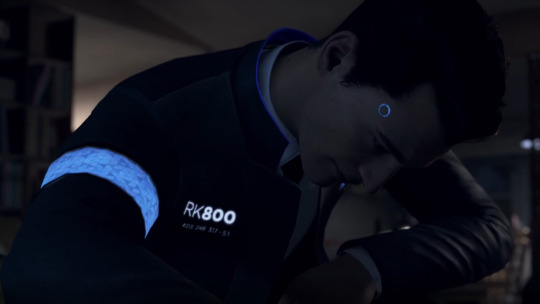
In ‘Russian Roulette’, Connor can choose to pat Sumo.
This yields no personal benefit to Connor or the mission.
He is alone and no-one is watching him. There is no reason for him to. Sumo at this point has already been placated. This is not an attempt to fix a complicated relationship or gain favour after a misunderstanding. This is Connor being empathetic.
If the player does not choose to pat Sumo, all of Connor’s behaviours are up in the air for interpretation.
If the player chooses to pat Sumo, Connor is alive. It just depends whether he’s willing to accept that or not.
This essay is titled Schrödinger’s Dog. Feel free to respond.
149 notes
·
View notes
Text
AAAAAAAAAAAAAAAAAAAAAAAAAAAAAAAAAAAAAAAAAAAAAAAAAAAAAAAAAAAAAAAAAAAAAAAAAAAAAAAAAAAAAAAAAAAAAAAAAAAAAAAAAAAAAAAAAAAAAAAAAAAAAAAAAAAAAAAAAAAAAAAAAAAAAAAAAAAAAAAAAAAAAAAAAAAAAAAAAAAAAAAAAAAAAAAAAAAAAAAAAAAAAAAAAAAAAAAAAAAAAAAAAAAAAAAAAAAAAAAAAAAAAAAAAAAAAAAAAAAAAAAAAAAAAAAAAAAAAAAAAAAAAAAAAAAAAAAAAAAAAAAAAAAAAAAAAAAAAAAAAAAAAAAAAAAAAAAAAAAAAAAAAAAAAAAAAAAAAAAAAAAAAAAAAAAAAAAAAAAAAAAAAAAAAAAAAAAAAAAAAAAAAAAAAAAAAAAAAAAAAAAAAAAAAAAAAAAAAAAAAAAAAAAAAAAAAAAAAAAAAAAAAAAAAAAAAAAAAAAAAAAAAAAAAAAAAAAAAAAAAAAAAAAAAAAAAAAAAAAAAAAAAAAAAAAAAAAAAAAAAAAAAAAAAAAAAAAAAAAAAAAAAAAAAAAAAAAAAAAAAAAAAAAAAAAAAAAAAAAAAAAAAAAAAAAAAAAAAAAAAAAAAAAAAAAAAAAAAAAAAAAAAAAAAAAAAAAAAAAAAAAAAAAAAAAAAAAAAAAAAAAAAAAAAAAAAAAAAAAAAAAAAAAAAAAAAAAAAAAAAAAAAAAAAAAAAAAAAAAAAAAAAAAAAAAAAAAAAAAAAAAAAAAAAAAAAAAAAAAAAAAAAAAAAAAAAAAAAAAAAAAAAAAAAAAAAAAAAAAAAAAAAAAAAAAAAAAAAAAAAAAAAAAAAAAAAAAAAAAAAAAAAAAAAAAAAAAAAAAAAAAAAAAAAAAAAAAAAAAAAAAAAAAAAAAAAAAAAAAAAAAAAAAAAAAAAAAAAAAAAAAAAAAAAAAAAAAAAAAAAAAAAAAAAAAAAAAAAAAAAAAAAAAAAAAAAAAAAAAAAAAAAAAAAAAAAAAAAAAAAAAAAAAAAAAAAAAAAAAAAAAAAAAAAAAAAAAAAAAAAAAAAAAAAAAAAAAAAAAAAAAAAAAAAAAAAAAAAAAAAAAAAAAAAAAAAAAAAAAAAAAAAAAAAAAAAAAAAAAAAAAAAAAAAAAAAAAAAAAAAAAAAAAAAAAAAAAAAAAAAAAAAAAAAAAAAAAAAAAAAAAAAAAAAAAAAAAAAAAAAAAAAAAAAAAAAAAAAAAAAAAAAAAAAAAAAAAAAAAAAAAAAAAAAAAAAAAAAAAAAAAAAAAAAAAAAAAAAAAAAAAAAAAAAAAAAAAAAAAAAAAAAAAAAAAAAAAAAAAAAAAAAAAAAAAAAAAAAAAAAAAAAAAAAAAAAAAAAAAAAAAAAAAAAAAAAAAAAAAAAAAAAAAAAAAAAAAAAAAAAAAAAAAAAAAAAAAAAAAAAAAAAAAAAAAAAAAAAAAAAAAAAAAAAAAAAAAAAAAAAAAAAAAAAAAAAAAAAAAAAAAAAAAAAAAAAAAAAAAAAAAAAAAAAA
HE.

26 notes
·
View notes
Text
the way he slayed bitch you don't understand how not normal i am about him

39 notes
·
View notes
Text
why would he do that beside showing off he's extremely hot
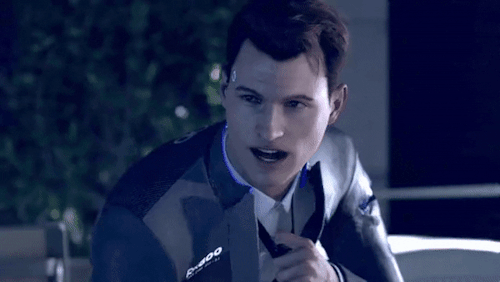
35 notes
·
View notes
